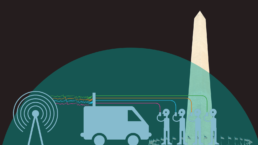In the first weeks of the COVID-19 pandemic, a location data broker called Veraset offered officials in Washington, DC full access to its proprietary database of “highly sensitive” device-level GPS data, collected from cell phones, for the entire DC metro area.
By Bennett Cyphers, Electronic Frontier Foundation
The officials accepted the offer, according to public records obtained by EFF. Over the next six months, Veraset provided the District with regular updates about the movement of hundreds of thousands of people—cell phones in hand or tucked away in backpacks or pockets—as they moved about their daily lives. The DC Office of the Chief Technology Officer (OCTO) and The Lab @ DC, a division of the Office of the City Administrator, accepted the data and uploaded it to the District’s “Data Lake,” a unified system for storing and sharing data across DC government organizations. The dataset was only authorized for uses related to COVID research, and there’s no evidence that it has been misused. But it’s unclear to what extent the policies in place bind the use or sharing of the data within the DC government.

This is far from the only instance of data sharing between private location data brokers and government agencies. Reports at the beginning of the pandemic indicated that governments around the world began working with data brokers, and in the documents we obtained, Veraset said that it was already working with “a few different agencies.” But to our knowledge, these documents are the first to detail how Veraset shared raw, individually-identifiable GPS data with a government agency. They highlight the scope and sensitivity of highly-invasive location data widely available on the open market. They also demonstrate the risk of “COVID-washing,” in which data brokers might try to earn goodwill by giving away their hazardous product to public health officials during a health crisis.
Recent Posts
These Veterans Starved Themselves To Protest The War In Gaza
July 8, 2025
Take Action Now As food in Gaza becomes increasingly scarce, activists are pushing their bodies to the limit in solidarity.By Emmet Fraizer, The…
ICE Agents Are Terrorizing Los Angeles With Brutal Tactics
July 8, 2025
Take Action Now ICE agents have established a pattern of brutal use of force in immigration raids.By Jonah Valdez, The InterceptSince June 6,…
Talk World Radio: India Walton On Zohran Mamdani And Freezing Out ICE
July 7, 2025
Take Action Now India Walton, former Democrat nominee for mayor of Buffalo, NY, discusses Zohran Mamdani and the race for NYC mayor and how to deal…
How Climate Change Is Worsening Flooding And Heavy Rainfall
July 7, 2025
Take Action Now The latest science on the link between climate change and natural disasters — and how they may be playing out where you live.By…




